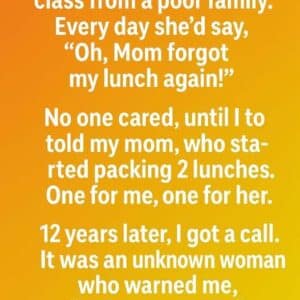For weeks, my daughter came home from school with dim eyes and quiet tears, and I couldn’t understand why. I did what every parent does at first—I tried to explain it away. She’s tired. It’s a phase. School is an adjustment. But the knot in my stomach never really loosened.
In the end, I trusted that knot more than the excuses in my head. I slipped a recorder into her backpack and pressed play on a truth no parent ever wants to hear.
Advertisement
I’m 36. Until recently, I thought I had the basics of life under control. A good marriage. A safe suburb. A slightly crooked little house with creaky wooden floors that I secretly loved. And Lily—my six-year-old girl who seemed to collect light everywhere she went.
She was the kind of kid other adults gravitated toward—chatty, generous, always making up songs and twirling in the kitchen. When first grade started in September, she marched into that school like it was the grand opening of her own kingdom. Her backpack was almost as big as she was, the straps bouncing as she ran, her self-done braids uneven and perfect.
“Bye, Mommy!” she’d yell over her shoulder, like she was heading off to conquer the world.
I used to sit in the car after drop-off and just smile, letting the quiet settle around me. Every afternoon, she’d barrel through the front door full of stories—about glitter glue explosions, who got to feed the class hamster, and how her teacher, Ms. Peterson, said she had “the neatest handwriting in class.” I actually teared up when she told me that. It felt like everything was falling into place.
For weeks, it was exactly what I’d hoped school would be for her: safe, fun, full of friends and finger paint.
Then, in late October, something shifted.
It didn’t happen all at once. There wasn’t a blow-up or a dramatic meltdown. Just small signs at first. A longer pause before getting out of bed. A little more silence on the ride home. Shoes that “didn’t feel right.” Tears over nothing.
She stopped skipping to the car at pickup. Instead, she walked slowly, head down, clutching her backpack like it was the only thing keeping her upright. Her sweater came home with a thick black marker line across the front. Her drawings—once proudly presented—started showing up wrinkled, shoved to the bottom of her bag.
Advertisement
One morning, I went to tell her it was time to leave and found her sitting on the edge of her bed in her pajamas, staring at her sneakers like they were something dangerous.
“Sweetheart,” I said, kneeling in front of her, “we need to get dressed. We’ll be late.”
She didn’t move. Her lower lip trembled. “Mommy… I don’t want to go.”
The air left my lungs. “Why not? Did something happen?”
She shook her head so hard her hair swung. “No. I just… I don’t like it there.”
“Did someone hurt your feelings? Say something mean?” I pressed gently.
Her eyes dropped to the carpet. “No. I’m just tired.”
“You used to love school,” I reminded her softly.
“I know,” she whispered. “I just don’t anymore.”
That night she picked at her dinner. It was like watching a dimmer switch slowly being turned down on my own child. I asked if someone was being mean. She said no, again. But her voice cracked, and then she bolted to her room. I wanted to believe her. I really did.
But I had seen too many kids in my life to mistake what I saw in her eyes: fear.
Advertisement
The next morning, I dug through our junk drawer and pulled out a small digital recorder I’d used years ago for interviews. I tested it, made sure it still worked, and slipped it into the front pocket of Lily’s backpack, tucked behind tissues and hand sanitizer. It was small enough that she didn’t even notice when I zipped it up.
All day, that recorder sat in my mind like a stone.
When she came home, I hugged her, asked about her day, then sent her to the living room to watch cartoons. While she sang along to some theme song in the background, I went to my bedroom, shut the door, and pressed play.
At first, it sounded like any classroom: the soft scrape of chairs, pencils scratching paper, children whispering. For a moment, I almost felt foolish. Maybe I really had been imagining things.
Then I heard it.
“Lily, stop talking and look at your paper.”
The voice was sharp. Impatient. It had an edge that made my throat go dry. That wasn’t Ms. Peterson. This was someone else.
“I—I wasn’t talking. I was just helping Ella—” Lily’s voice trembled, small and unsure.
“Don’t argue with me!” the woman snapped. “You’re always making excuses. Just like your mother.”
I jabbed the pause button, my heart pounding in my ears. Did I hear that right?
I forced myself to press play again.
“You think the rules don’t apply to you because you’re sweet and everyone likes you?” the woman went on. “Let me tell you something, little girl—being cute won’t get you far in life.”
I heard a sniffle. My daughter trying not to cry.
“And stop crying! Crying won’t help you. If you can’t behave, you’ll spend recess inside.”
There was a rustle, then a long stretch of uneasy silence. Finally, in a low mutter, the teacher said:
“You’re just like Emma… always trying to be perfect.”
Emma. My name.
This wasn’t a teacher losing her patience once. This was aimed. Poisoned. Personal.
I listened to the whole thing twice, my hands shaking so badly I could barely hold the recorder. I didn’t sleep that night. I lay in bed staring at the ceiling, replaying that cold voice over and over, hating that my little girl had been sitting there alone with it while I kissed her goodbye at the gate, trusting she was safe.
The next morning, right after drop-off, I walked into the principal’s office.
Advertisement
She greeted me with a professional smile. I didn’t bother with small talk. I placed the recorder on her desk and said, “I need you to listen to this.”
She pressed play. The cheerful background noise of the classroom filled the space. Then came the teacher’s words. The snapping. The threat. The comment about me.
By the time the recording finished, the principal’s face had gone pale.
“Emma,” she said carefully, “I am so sorry this happened. But—are you sure you don’t know who this is?”
“No,” I said. “I’ve never met this woman. I thought Lily still had Ms. Peterson.”
The principal tapped at her keyboard, squinting at her screen. “Ms. Peterson’s been out sick for several weeks. We brought in a long-term substitute. Her name is Melissa.” She turned the screen toward me. “This is her.”
The picture hit me like a bucket of ice water.
Melissa.
I hadn’t seen her in 15 years, but there she was—older, sure, but unmistakable.
“We went to college together,” I said slowly.
The principal’s eyebrows rose. “You know her?”
“We weren’t friends,” I answered, my throat tight. “We were in a few classes. There was one group project. She thought I was trying to get a better grade by… playing nice with the professor.”
I didn’t mention the rest. How she’d once cornered me in the student union to accuse me of “putting on an act.” How she’d rolled her eyes when I asked questions. How I’d overheard her telling someone, “Emma’s fake sweet. Like a sugar-coated knife.”
I had filed those memories away and moved on with my life. She clearly hadn’t.
“We’ll handle this internally,” the principal said. “Please, let us speak with her first.”
I wanted to trust that. But I had already trusted the system once.
That afternoon, before I’d decided my next move, the school called. “We need you to come in,” they said.
When I got there, they escorted me into the front office. Melissa was already there, arms crossed, jaw set. She looked me up and down like I was the one who’d done something wrong.
“Of course it’s you,” she said, lips curling.
“What did you just say?” I asked.
“You always thought you were better than everyone else,” she said flatly. “Even back then. Professors loved you. People liked you. Little Miss Perfect.” Her voice sharpened. “You walked around like the world was some Hallmark card.”
I stared at her, shocked and strangely sad.
“That was fifteen years ago,” I said. “And whatever you thought about me never gave you the right to treat my daughter the way you did.”
“She needed to learn the world doesn’t reward pretty little girls who think the rules don’t apply to them,” she snapped back. “Better now than when she’s older.”
“You bullied a six-year-old because you had a problem with me,” I said, each word shaking.
“She’s just like you,” she hissed. “All smiles and sunshine. It’s fake.”
Before I could respond, the principal’s voice cut through the tension. “That’s enough, Melissa. Please step outside.”
For a second, I thought she might argue. Instead, she walked past me, eyes locked on mine until the last moment, then disappeared down the hall.
The principal turned to me, her face serious. “We’ll be in touch,” she said quietly.
I drove home on autopilot, my hands trembling on the steering wheel. That evening, I didn’t tell Lily everything. I just told her she wouldn’t be seeing Ms. Melissa anymore, and that the principal had promised it was over.
The next morning, I saw the difference immediately.
Lily woke up early. She brushed her own hair and picked out her sparkliest unicorn shirt. On the drive to school, she looked out the window and hummed.
“Is Ms. Peterson coming back soon?” she asked.
“I don’t know, baby,” I said. “But the principal told me you’ll have a different teacher for now. Someone kind.”
She nodded slowly, absorbing that.
That afternoon, she ran to the car like she used to, waving a construction-paper turkey. “We made thankful feathers!” she shouted.
I almost cried in the pickup lane.
Advertisement
A week later, the school dismissed Melissa. They sent letters home, apologized to the families whose children had been affected, and brought in counselors to help the kids process what had happened. They called me several times to check in, to ask how Lily was doing.
They handled it better than I expected. But the fact that it had happened at all stayed lodged in my chest like a small, sharp stone.
That night, after Lily went to bed, I sat on the couch in the dim light of the living room. The house felt extra quiet. My husband, Derek, who had been away for six months for work and had stayed on the phone with me through every twist of this mess, rested his hand gently on my knee.
“She’s going to be okay,” he said.
“I know,” I replied. “I just… can’t wrap my head around it.”
He tilted his head. “What part?”
“How someone can hold onto something for that long,” I said. “From college. We weren’t even close. I barely knew her. And she took it out on a child.”
“Some people never let go of resentment,” he said. “That’s on them, not you. What matters is you saw something was wrong. You listened. You acted. You protected her.”
I leaned against him and let my eyes close for a moment. “I just wish I’d caught it sooner.”
“We all trusted the school,” he said. “You still caught it before it went on longer. That counts.”
The next day, Lily and I made cookies in the kitchen. She hummed while she stirred, sprinkling in chocolate chips with serious concentration. At one point, she looked up and said, matter-of-factly, “Mommy, I’m not scared to go to school anymore.”
I swallowed the lump in my throat. “I’m really glad to hear that.”
She frowned a little. “Why did Ms. Melissa not like me?”
I crouched down next to her and brushed flour off her nose. “Some people are unkind because of their own problems. It has nothing to do with you.”
She considered that, then nodded. “I like being kind,” she said, turning back to the bowl.
“You always have been,” I told her, kissing her forehead.
She went back to stirring as if a monster hadn’t been removed from her classroom just days earlier. Children are resilient like that. They move forward faster than we do.
I don’t think about Melissa often. But I do think about what she taught me—ironically, not the lesson she intended.
Sometimes, the monsters our kids are terrified of aren’t in their closets or under their beds. They wear sensible shoes and teacher lanyards, hold old grudges, and hide behind authority.
And they can be stopped.
If we’re paying attention.
If we’re brave enough to listen to what our children aren’t saying—and, sometimes, brave enough to press “record.”





